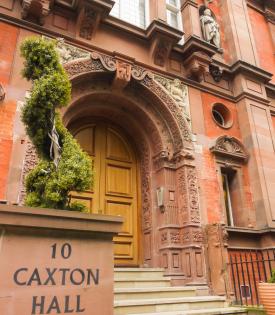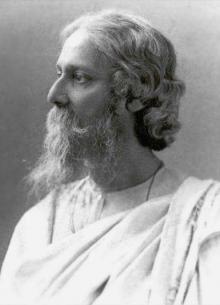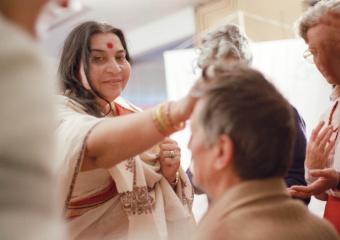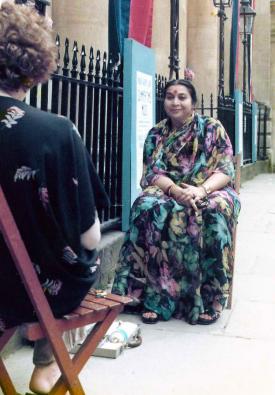A Town Hall for the World
 In the City of Westminster, in central London, there is a hall with a history. For most of its 128 years, its rooms and grand hall have sat quiet. Quiet in daytime, that is…
In the City of Westminster, in central London, there is a hall with a history. For most of its 128 years, its rooms and grand hall have sat quiet. Quiet in daytime, that is…
Caxton Hall was a place of ideas, of change, of challenges and bold direction. Once an edifice of government, a town hall, it has had a dual role over the years. Civil ceremonies and celebrity marriages have taken place as well as rallies for reform and political activism. In all, it was a serviceable facility renamed in honor of William Caxton, the inventor of a printing press, a pivotal instrument in world communication. And in the hall of his name, there has been much communication.
Dangerous ideas have circulated here, causes and appeals. It was, in many ways, the heartbeat of a great nation, somewhere between the political theatre of parliament and the eccentric free-wheeling circus of Hyde Park corner.
| Even the voice of the great Bengali poet and Nobel Prize winner Rabindranath Tagore has been heard in Caxton’s rooms. His well-attended evening lectures in the summer of 1913 had such titles as ‘The Relationship of the Individual to the Universe,’ ‘Soul Consciousness,’ ‘Realization in Love’ and ‘The Problem of Self.’ These were direct precursors to Shri Mataji Nirmala Devi’s talks in the same space some seventy years later. He spoke the themes. She would give the details.
Between 1977 and 1983, Shri Mataji took to the Caxton Hall stage almost one hundred times. This marked an unmistakable shift in her messaging: she was now in the public realm. Her words were there for everyone to hear. Invitation was open. Admission was free. She spoke in the same tradition as Tagore. Her concern was as real and immediate. The message was similar. It came from the East to the West, a sharing of a knowledge that was ancient. |
 Rabindranath TagoreZoom Image Rabindranath TagoreZoom Image |
| But there was also a difference between these two Caxton Hall speakers. In the case of Shri Mataji Nirmala Devi, the lecture came with a bonus. At the end of the evening, she always offered the experience of self-realization. In the stillness of deep meditation, the audience had the opportunity to feel their own depth. Both spoke of looking within, but now Tagore’s ‘Realization of Brahma’ had become Shri Mataji’s ‘Experience of the True Self’. |
|
 Zoom ImageOver a period of six years, Shri Mataji Nirmala Devi spoke to crowds of varying size in this historic building. She spoke of life, of current events, of meaning and values, morality and love. It was a town hall for the world. But underlying all the words was always a concern for the spirit. She asked the big questions: “Why are we here? What is the purpose of our life? Why has God created us?” And what punctuated the conclusion of each evening was the experience that dawned naturally from such inquiries. After listening and asking, the audience was invited to connect with their spirit, to identify with their true Self.
Zoom ImageOver a period of six years, Shri Mataji Nirmala Devi spoke to crowds of varying size in this historic building. She spoke of life, of current events, of meaning and values, morality and love. It was a town hall for the world. But underlying all the words was always a concern for the spirit. She asked the big questions: “Why are we here? What is the purpose of our life? Why has God created us?” And what punctuated the conclusion of each evening was the experience that dawned naturally from such inquiries. After listening and asking, the audience was invited to connect with their spirit, to identify with their true Self.
This series of programs was truly the beginning of Shri Mataji’s public ministry. This was her step onto the stage where everyone was welcomed to listen, where money was not taken, but where that which was most valuable was freely given.
 Interview in Bath, 1977Zoom ImageIn a modern society, the avenues for public life are few. Neither winning public office nor standing on a Sunday soapbox in the park guarantees the listening ear of the public, let alone the heart.
Interview in Bath, 1977Zoom ImageIn a modern society, the avenues for public life are few. Neither winning public office nor standing on a Sunday soapbox in the park guarantees the listening ear of the public, let alone the heart.
A book of memoirs, a breakfast show chat, a song in the music charts, are each as transient and forgotten as the next. To convince fully is a slow labour. And the public is fickle.
To rent a hall at a convenient location, to charge no admission, to answer questions and listen to concerns, to be among people who sought meaning and understanding and inner peace was the most generous of actions. She made herself available, gave her time without concern. Her only motive was love.
As Shri Mataji phrased it in 1980, “The search is on and many shops have opened. This is not a shop. This is a temple and a temple in the marketplace has very little value. If you have to climb up seven mountains to go to the temple, it has much more value. But only a few can reach there alive. So the temple had to come down to London, to Caxton Hall, to talk to the people.”
As Rabindranath Tagore said on the 17th of June 1913, in the open confines of Caxton Hall, “It is the high function of love to welcome all limitations and to transcend them.”
He knew what love was and could describe it.
So did Shri Mataji. And her understanding came with action.